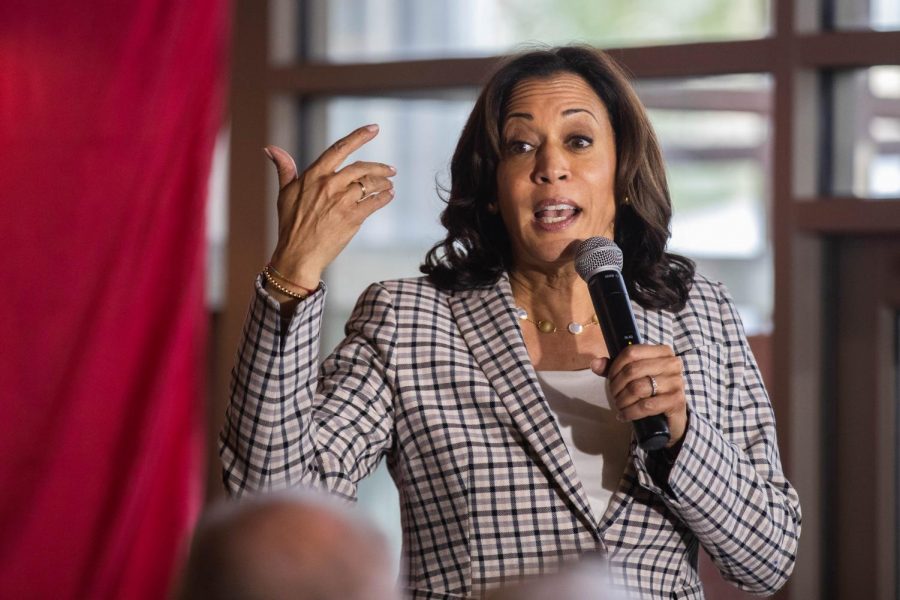Racism, sexism and a victory. How Kamala Harris made history as Joe Biden’s vice president
Sen. Kamala Harris, D-Calif., addresses supporters at Backpocket Brewery on Thursday, September 19, 2019.
November 7, 2020
WASHINGTON — Kamala Harris will become the 49th vice president of the United States, the first woman and the first person of color to hold the nation’s second-highest office.
Her election follows a campaign in which the California Democrat pushed hard to reach out to Blacks, Latinos, women and others who have historically been in the political shadows.
Along the way, she had to fight opponents who tarred her with remarks often viewed as racist and sexist.
President Donald Trump frequently took aim at her. “You don’t often see a president attacking the opposing vice presidential candidate,” said Joel Goldstein, a vice presidential expert and law professor emeritus at St. Louis University.
But Harris, he said, was a good campaigner who made no slips and helped mobilize key Democratic constituencies.
Harris, 56, is not the first non-white to win high office — Barack Obama won two terms as president. And in an increasingly diverse nation, non-white candidates who can win with broad constituencies are becoming commonplace.
But as a woman and person of color, Harris had to overcome the perception that in so many ways “she is the antithesis of all the elected leadership we’ve had,” said Kimberly Peeler-Allen, visiting practitioner at the Center for American Women in Politics in New Jersey.
Harris arrived on the ticket after running her own race for the Democratic presidential nomination in 2019.
Support waned throughout the year, and she was out of the race by December. In perhaps her most notable moment, she focused forcefully on Biden in a June debate, bringing up his work with segregationist senators and opposition to school busing in the 1970s.
Biden, who has deep ties in the African American community, put her on the ticket anyway. As the 2020 campaign neared its finish, Harris provided an extra boost in getting Black voters to the polls, adding a special incentive to stand in long lines or head to a drive-in rally. Her presence served to “reinforce the excitement about the ticket,” said Hilary McLean, a Sacramento-based Democratic consultant.
Harris spent the fall often campaigning in areas where that excitement could be stoked. In September, she visited Headliners Barber Shop in Detroit, a Black-owned business on one of the Black community’s major roads.
“It was very important to us and to me personally to be here,” Harris said. She spoke about how Black business has been hit hard by the COVID-19 pandemic.
The campaign also ran ads aimed specifically at Black voters, including one in a barber shop where voters talked about the election.
Harris, a veteran campaigner who has won three statewide races in California, proved adept at staying on the message despite the Trump campaign’s efforts to rattle her.
“She is not a person that will get distracted by gaslighting and name-calling,” said Aimee Allison, founder and president of She the People, a political network for women of color.
From the day in August that Harris was named to the ticket, the Trump mantra was the same: She’s a radical. A socialist. She’s about to benefit from a plan to quickly become president because 77-year-old Biden is unable to do the job.
Vice President Mike Pence said she’d force people to reduce the amount of red meat they could eat. Surrogates posted misleading videos suggesting she laughed heartily about urban violence. They said House Speaker Nancy Pelosi was an instrumental part of the replace-Biden plan.
None of that was true, but Trump and his backers were relentless.
Harris, he said, was “nasty,” a “monster,” and “totally unlikable.”
Republicans called all this standard political theater, and pointed out that Harris on the ticket was hardly likely to determine the race’s outcome.
“Tell me the last time a vice presidential candidate made a difference,” said Paul Shumaker, a Raleigh, North Carolina-based Republican consultant.
Harris had other obstacles to overcome.
“A lot of folks out there still have a problem seeing a woman in an executive role like that,” said Michael Steele, a former GOP national chairman who supported Biden. He said criticism of how Harris reacted and spoke during her October 7 debate with Pence “had nothing to do with substance or the quality of her answers.”
Harris, who was San Francisco’s chief prosecutor from 2004 to 2011 and state attorney general from 2011 to 2017, also faced questions about what she believed and who she was politically.
She was rated by Americans for Democratic Action as one of the most liberal U.S. senators in 2017 and 2018, but was unable to capture a liberal constituency in her presidential campaign.
At one point she supported Sen. Bernie Sanders’ “Medicare for All” plan, then backed away from that stance.
She faced skepticism from many Black activists for her self-described role as California’s “top cop.”
Black activists, though, ultimately rallied around her.
“I was more interested in what her views are now,” said A’shanti Gholar, president of Emerge America, a Democratic women’s group. “There’s no perfect candidate.”
___
(c)2020 McClatchy Washington Bureau
Distributed by Tribune Content Agency, LLC



